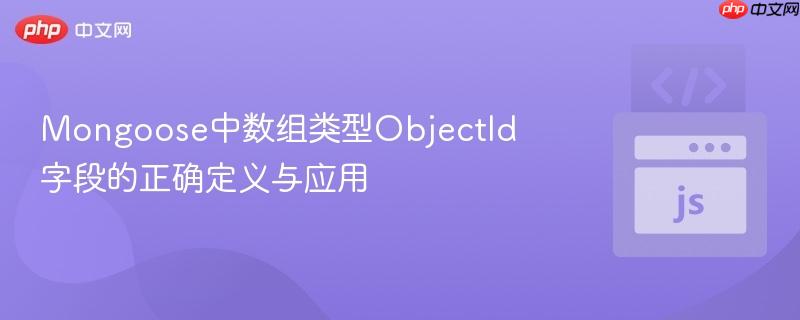
本文深入探讨了在mongoose模型中正确定义和使用`objectid`数组字段的关键方法。通过分析一个常见的mern api数据存储问题——用户id未能正确保存到`conversation`模型的`members`数组中,我们揭示了错误的模式定义方式,并提供了标准的解决方案。教程将详细解释如何将`objectid`数组正确地声明为`type: [mongoose.schema.types.objectid]`,确保数据能够被mongoose正确识别、验证并持久化到mongodb数据库,从而避免数据存储异常。
在构建基于MERN(MongoDB, Express.js, React, Node.js)栈的应用时,Mongoose作为MongoDB的对象数据模型(ODM)库,在数据建模方面扮演着核心角色。然而,开发者在使用Mongoose定义包含特定类型数组(例如,ObjectId数组)的字段时,可能会遇到数据未能正确保存的问题。本教程将以一个具体的案例为例,详细解析此类问题的原因及解决方案。
假设我们正在开发一个即时通讯应用,其中包含一个Conversation(会话)模型,该模型需要存储参与会话的用户ID列表。我们期望通过API传入两个用户ID,并将它们保存到Conversation模型的members数组中。
原始的API路由代码:
app.post("/api/conversation", async (req, res) => {
try {
const { sid, rid } = req.body; // sid 和 rid 预期是用户ID字符串
const newConversation = new Conversation({ members: [sid, rid] });
await newConversation.save();
res.status(200).send("created sucessfully");
} catch (error) {
console.log(error);
res.status(500).send("Failed to create conversation");
}
});原始的Mongoose Conversation 模型定义:
const mongoose = require("mongoose");
const conversationSchema = mongoose.Schema({
members:[ { // 这是一个数组,其元素是对象
type: mongoose.Schema.Types.ObjectId,
ref: "User",
}],
});
const Conversation = mongoose.model("conversation", conversationSchema);
module.exports = Conversation;在上述代码中,API调用成功并返回“created sucessfully”消息。然而,当检查MongoDB数据库时,members数组中却存储了[null, null],而非预期的用户ID。
这个问题的核心在于Mongoose Schema 中 members 字段的定义方式不正确。
当我们这样定义 members 字段时:
members:[ {
type: mongoose.Schema.Types.ObjectId,
ref: "User",
}]Mongoose将其解释为:members 是一个数组,而数组的每个元素都是一个包含 type 和 ref 属性的匿名对象。换句话说,Mongoose期望的数据结构是 [{ type: someId, ref: "User" }, { type: anotherId, ref: "User" }]。
然而,在API中,我们传入的是 members: [sid, rid],其中 sid 和 rid 仅仅是表示 ObjectId 的字符串。Mongoose尝试将这些简单的 ObjectId 字符串强制转换为预期的复杂对象结构时,由于类型不匹配,转换失败,最终导致数据库中存储了 null 值。
要正确地定义一个包含 ObjectId 数组的字段,我们应该明确告诉Mongoose,members 字段是一个数组,并且数组的每个元素都是一个 ObjectId 类型。
修正后的Mongoose Conversation 模型定义:
const mongoose = require("mongoose");
const conversationSchema = mongoose.Schema({
members: { // 这是一个字段,其类型是ObjectId的数组
type: [mongoose.Schema.Types.ObjectId], // 明确指出这是一个ObjectId类型的数组
ref: "User", // ref 属性应用于数组中的每个ObjectId元素
},
});
const Conversation = mongoose.model("conversation", conversationSchema);
module.exports = Conversation;在这个修正后的定义中:
使用修正后的模型定义,再次执行API调用:
// 假设请求体中包含:
// {
// "sid": "60c72b1f9e2b8f001c8e2b1f", // 示例用户ID
// "rid": "60c72b1f9e2b8f001c8e2b20" // 示例用户ID
// }
app.post("/api/conversation", async (req, res) => {
try {
const { sid, rid } = req.body;
// 此时 Conversation 模型已使用正确的 schema 定义
const newConversation = new Conversation({ members: [sid, rid] });
await newConversation.save();
res.status(200).send("created sucessfully");
} catch (error) {
console.log(error);
res.status(500).send("Failed to create conversation");
}
});现在,当您检查MongoDB数据库时,conversation 文档的 members 字段将正确地包含传入的用户ID:
{
"_id": "...",
"members": [
"60c72b1f9e2b8f001c8e2b1f",
"60c72b1f9e2b8f001c8e2b20"
],
"__v": 0
}const conversation = await Conversation.findById(conversationId).populate("members");这只有在 ref: "User" 正确定义的情况下才能工作。
正确地在Mongoose中定义数组类型的 ObjectId 字段是确保数据完整性和应用功能正常运行的基础。通过使用 type: [mongoose.Schema.Types.ObjectId] 这种明确的语法,开发者可以避免常见的类型转换错误,并确保用户ID等关键数据能够准确无误地存储到MongoDB数据库中。理解Mongoose Schema的细微差别,对于构建健壮和可维护的MERN应用程序至关重要。
以上就是Mongoose中数组类型ObjectId字段的正确定义与应用的详细内容,更多请关注php中文网其它相关文章!

每个人都需要一台速度更快、更稳定的 PC。随着时间的推移,垃圾文件、旧注册表数据和不必要的后台进程会占用资源并降低性能。幸运的是,许多工具可以让 Windows 保持平稳运行。

Copyright 2014-2025 https://www.php.cn/ All Rights Reserved | php.cn | 湘ICP备2023035733号